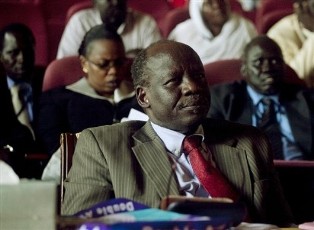Sudan denies agreeing to mixed force in Darfur
Nov 18, 2006 (KHARTOUM) — Sudan has denied it has agreed to the deployment of combined United Nations and African Union peacekeeping forces in the troubled Darfur region.
 “We did not agree to the deployment of hybrid United Nations-African Union forces in Darfur, as was declared by UN Secretary General Kofi Annan after the Addis Ababa consultative meeting,” Sudanese Foreign Minister Lam Akol told reporters Saturday.
“We did not agree to the deployment of hybrid United Nations-African Union forces in Darfur, as was declared by UN Secretary General Kofi Annan after the Addis Ababa consultative meeting,” Sudanese Foreign Minister Lam Akol told reporters Saturday.
Akol, who attended Thursday’s talks in the Ethiopian capital, said the Sudanese delegation agreed only on UN technical units to back up the AU forces in Darfur.
“We agreed that the AU forces carry on with their mission and receive support from UN technical units,” Akol said. “We also rejected a proposal for a combined AU-UN command, as well as the proposed number of troops.”
He said Khartoum still has reservations about the figure of 17,300 troops proposed by the United Nations, and added that talk about troop numbers in Darfur was premature.
“We think it appropriate to leave it to Sudanese, UN and AU military experts to determine the number of the troops required,” he said.
Akol said he considered the outcome of the Addis Ababa meeting on Darfur was that UN Security Council Resolution 1706 “has been overtaken, and the search for an alternative that will be acceptable to all parties is under way”.
The resolution, adopted on August 31, called for the deployment of 20,000 UN peacekeepers in Darfur — an option repeatedly rejected by Khartoum.
Annan’s announcement on Thursday took many people by surprise because of Sudan’s vehement rejections of any UN role and its insistence that only the current AU force can operate in Darfur.
Diplomats and observers who attended the talks that led to the apparent compromise said Khartoum’s stance was not entirely clear, as Sudanese officials repeated that no UN peacekeepers would be allowed on the ground.
The war in Darfur erupted in February 2003 when rebels from minority tribes took up arms to demand an equal share of national resources, prompting a heavy-handed crackdown from government forces and a proxy militia called the Janjaweed.
At least 200,000 people have since died from the combined effects of fighting, famine and disease, according to the United Nations. Some sources say the toll is much higher.
(AFP)
